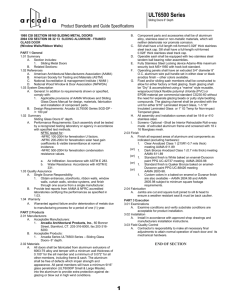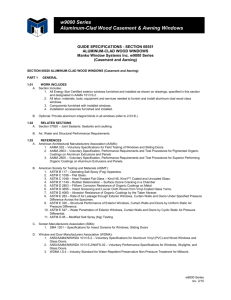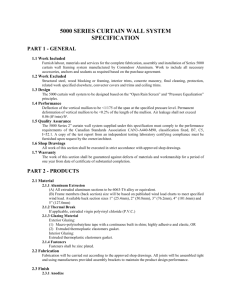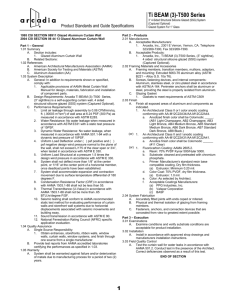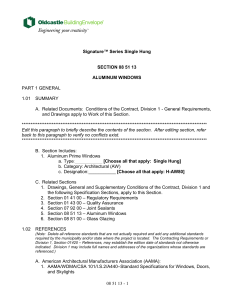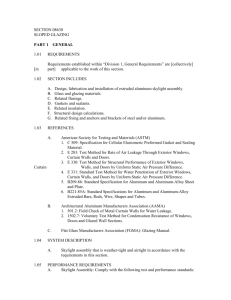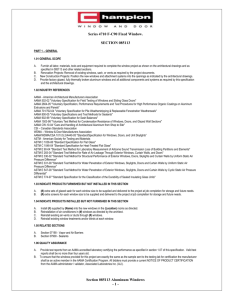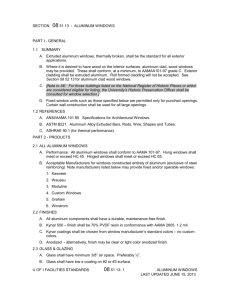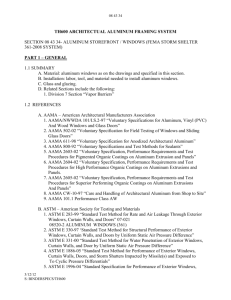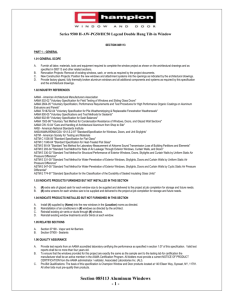iii. execution - Gaslight Media
advertisement
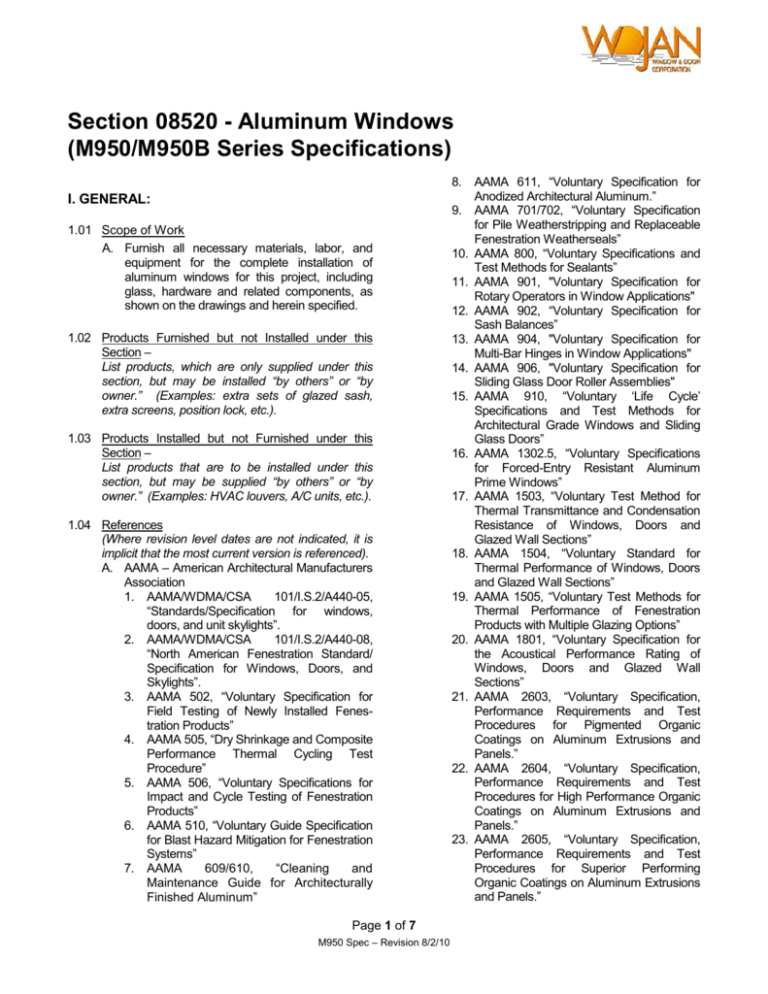
Section 08520 - Aluminum Windows (M950/M950B Series Specifications) I. GENERAL: 1.01 Scope of Work A. Furnish all necessary materials, labor, and equipment for the complete installation of aluminum windows for this project, including glass, hardware and related components, as shown on the drawings and herein specified. 1.02 Products Furnished but not Installed under this Section – List products, which are only supplied under this section, but may be installed “by others” or “by owner.” (Examples: extra sets of glazed sash, extra screens, position lock, etc.). 1.03 Products Installed but not Furnished under this Section – List products that are to be installed under this section, but may be supplied “by others” or “by owner.” (Examples: HVAC louvers, A/C units, etc.). 1.04 References (Where revision level dates are not indicated, it is implicit that the most current version is referenced). A. AAMA – American Architectural Manufacturers Association 1. AAMA/WDMA/CSA 101/I.S.2/A440-05, “Standards/Specification for windows, doors, and unit skylights”. 2. AAMA/WDMA/CSA 101/I.S.2/A440-08, “North American Fenestration Standard/ Specification for Windows, Doors, and Skylights”. 3. AAMA 502, “Voluntary Specification for Field Testing of Newly Installed Fenestration Products” 4. AAMA 505, “Dry Shrinkage and Composite Performance Thermal Cycling Test Procedure” 5. AAMA 506, “Voluntary Specifications for Impact and Cycle Testing of Fenestration Products” 6. AAMA 510, “Voluntary Guide Specification for Blast Hazard Mitigation for Fenestration Systems” 7. AAMA 609/610, “Cleaning and Maintenance Guide for Architecturally Finished Aluminum” Page 1 of 7 M950 Spec – Revision 8/2/10 8. AAMA 611, “Voluntary Specification for Anodized Architectural Aluminum.” 9. AAMA 701/702, “Voluntary Specification for Pile Weatherstripping and Replaceable Fenestration Weatherseals” 10. AAMA 800, “Voluntary Specifications and Test Methods for Sealants” 11. AAMA 901, "Voluntary Specification for Rotary Operators in Window Applications" 12. AAMA 902, “Voluntary Specification for Sash Balances” 13. AAMA 904, "Voluntary Specification for Multi-Bar Hinges in Window Applications" 14. AAMA 906, "Voluntary Specification for Sliding Glass Door Roller Assemblies" 15. AAMA 910, “Voluntary ‘Life Cycle’ Specifications and Test Methods for Architectural Grade Windows and Sliding Glass Doors” 16. AAMA 1302.5, “Voluntary Specifications for Forced-Entry Resistant Aluminum Prime Windows” 17. AAMA 1503, “Voluntary Test Method for Thermal Transmittance and Condensation Resistance of Windows, Doors and Glazed Wall Sections” 18. AAMA 1504, “Voluntary Standard for Thermal Performance of Windows, Doors and Glazed Wall Sections” 19. AAMA 1505, “Voluntary Test Methods for Thermal Performance of Fenestration Products with Multiple Glazing Options” 20. AAMA 1801, “Voluntary Specification for the Acoustical Performance Rating of Windows, Doors and Glazed Wall Sections” 21. AAMA 2603, “Voluntary Specification, Performance Requirements and Test Procedures for Pigmented Organic Coatings on Aluminum Extrusions and Panels.” 22. AAMA 2604, “Voluntary Specification, Performance Requirements and Test Procedures for High Performance Organic Coatings on Aluminum Extrusions and Panels.” 23. AAMA 2605, “Voluntary Specification, Performance Requirements and Test Procedures for Superior Performing Organic Coatings on Aluminum Extrusions and Panels.” 24. AAMA IPCB (08), “Standard Practice for the Installation of Windows and Doors in Commercial Buildings.” 25. AAMA CW-10, “Care and Handling of Architectural Aluminum from Shop to Site” B. ASTM – American Society for Testing and Materials 1. ASTM C 1036, “Standard Specification for Flat Glass” 2. ASTM C 1048 “Standard Specification for Heat-Treated Flat Glass—Kind HS, Kind FT Coated and Uncoated Glass” 3. ASTM C 1172, “Standard Specification for Laminated Architectural Flat Glass” 4. ASTM E 90, “Standard Test Method for Laboratory Measurement of Airborne Sound Transmission Loss of Building Partitions and Elements” 5. ASTM E 283, “Standard Test Method for Determining Rate of Air Leakage through Exterior Windows, Curtain Walls, and Doors under Specified Pressure Differences Across the Specimen” 6. ASTM E 330, “Standard Test Method for Structural Performance of Exterior Windows, Doors, Skylights and Curtain Walls by Uniform Static Air Pressure Difference” 7. ASTM E 331, “Standard Test Method for Water Penetration of Exterior Windows, Skylights, Doors, and Curtain Walls by Uniform Static Air Pressure Difference” 8. ASTM E 413, “Classification for Rating Sound Insulation” 9. ASTM E 547, “Standard Test Method for Water Penetration of Exterior Windows, Skylights, Doors, and Curtain Walls by Cyclic Static Air Pressure Difference” 10. ASTM E 987, “Standard Test Methods for Deglazing Force of Fenestration Products” 11. ASTM E 1048, “ 12. ASTM E 1332, “Standard Classification for Determination of Outdoor-Indoor Transmission Class” 13. ASTM E 1423, “Standard Practice for Determining Steady State Thermal Transmittance of Fenestration Systems” 14. ASTM E 1425, “Standard Practice for Determining the Acoustical Performance of Windows, Doors, Skylight, and Glazed Wall Systems” 15. ASTM E 1886, “Standard Test Method for Performance of Exterior Windows, Curtain Walls, Doors, and Impact Protective Systems Impacted by Missile(s) and Exposed to Cyclic Pressure Differentials” 16. ASTM E 1996, “Standard Specification for Performance of Exterior Windows, Curtain Walls, Doors, and Impact Protective Systems Impacted by Windborne Debris in Hurricanes” 17. ASTM E 2189, “Standard Test Method for Testing Resistance to Fogging in Insulating Glass Units” 18. ASTM E 2190 , “Standard Specification for Insulating Glass Unit Performance and Evaluation" 19. ASTM F 588, “Standard Test Methods for Measuring the Forced Entry Resistance of Window Assemblies, Excluding Glazing Impact” 20. ASTM F842, “Standard Test Methods for Measuring the Forced Entry Resistance of Sliding Door Assemblies, Excluding Glazing Impact” 21. ASTM F1642, "Standard Test Method for Glazing and Glazing Systems Subject to Airblast Loadings" 22. ASTM F1233, “Standard Test Method for Security Glazing Materials and Systems” C. CPSC – Consumer Product Safety Commission 1. CPSC16CFR1201, “Safety Standard for Architectural Glazing Materials” D. NFRC – National Fenestration Rating Council 1. NFRC 100-2010, “Procedure for Determining Product U-factors” (U-values)” 2. NFRC 102-2010, “Test Procedure for Measuring the Steady-State Thermal Transmittance of Fenestration Systems” 3. NFRC 200-2010, “Procedure for Determining Fenestration Product Solar Heat Gain Coefficient and Visible Light Transmittance at Normal Incidence” 4. NFRC 201-2010, “Procedure for Interim Standard Test Method for Measuring Solar Heat Gain Coefficient of Fenestration Systems Using Calorimetry Hot Box Methods” 5. NFRC 300-2010, “Test Method for Determining the Solar Optical Properties of Glazing Materials and Systems” 6. NFRC 301-2010, “Standard Test Method for Emittance of Specular Surfaces Using Spectrometric Measurements” 7. NFRC 400-2010, “Procedure for Determining Fenestration Product Air Leakage” Page 2 of 7 M950 Spec – Revision 8/2/10 8. NFRC 500-2010, “Procedure for Determining Fenestration Product Condensation Resistance Values” - AW-PG80-FW-60X99. B. Thermal Performance: 1. Windows shall meet Project requirements of U-value: SHGC: 2. Thermal performance to be verified by simulation & testing for conformance with 1.05 System description A. Windows: 3.25” frame depth (4.25" M950B Product); extruded aluminum with integral structural polyurethane thermal break in frame and sash members; finish factory-applied; frames and sash factory-assembled. B.Configuration: Single hung (AAMA designation “H”) Horizontal Sliding (AAMA designation “HS”) Fixed (AAMA designation “FW”) C. Glazing: Factory-glazed per Section 2.02F herein with: 2” applied muntins 5/8” flat grid within insulating glass airspace 1” flat grid within insulating glass airspace 5/8” simulated divided light 1” simulated divided light D. Installation: Installation type of: with: Strap Anchor - Field Applied (N/A for M950B Product) Nailfin - Factory Applied Receptor thermally broken - Field Applied (N/A for M950B Product) Panning - Field Applied Face Flange of: o 1.75” Length o 2.5” Length Snap-trim - Field Applied Custom 1.06 Performance Requirements: A. AAMA Performance Class: Per AAMA/WDMA/CSA 101/I.S.2/A44005, when tests are performed on the minimum test size indicated: Single hung: - H-HC50-60X99 Fixed: FW-HC80-60X99. Per (NAFS) AAMA/WDMA/CSA 101/I.S.2/ A440-08, when tests are performed on the minimum test size indicated: Single Hung: - AW-PG50-H-60X99 Horizontal Sliding: - CW-PG50-HS-120X62 Fixed: C. D. E. F. NFRC-100 (determining U-value by simulation or CMA) NFRC 102 (determining U-value by test) NFRC-200 (determining SHGC by simulation or CMA) NFRC-201 (determining SHGC by test) NFRC-300 (determining solar optical proper-ties by test) NFRC-301 (determining emittance by test) NFRC-400 (determining air infiltration by test) NFRC-500 (determining condensation resistance values by simulation) (Manufacturer to provide test results on request). Insulating Glass: Insulating glass units (IGU) shall be tested and certified for conformance with ASTM E 2190, based on testing per ASTM E 2189 by an IGCC/IGMA approved laboratory. Forced Entry Resistance: Shall meet the requirements for AAMA 1302.5 and conform to ASTM F 588 (Grade 40 minimum for hung & fixed. Grade 30 minimum for horizontal slider). Impact Resistance: Windows shall be tested for conformance with the requirements of ASTM E 1996 (test method: ASTM E 1886). (Manufacturer to provide test results on request). Blast Resistance: Windows (Hung and Fixed only) shall be tested for conformance with the requirements of ASTM F1642. (Manufacturer to provide test results on request). 1.07 Submittals A. Drawings: Upon request the window manufacturer may submit cross section drawings. Anchorage details are to be determined by others. B. Product data: manufacturer’s specifications, test reports from an AAMA-accredited Page 3 of 7 M950 Spec – Revision 8/2/10 laboratory, and standard details verifying conformance with specifications. C. Samples: one sample of specified finish for aluminum and other samples as requested by the architect. 1.08 Quality Assurance A. Submit for pre-bid qualification approval ten days prior to the bid opening: 1. One sample window representing the window being bid with color being the only exception. 2. Valid test reports not more than four years from test date (at time of submittal) from an AAMA-accredited laboratory confirming conformance to Paragraph 1.07 test results. B. Submit bids based only on pre-qualified “equal” as confirmed in a pre-bid written addendum. C. Furnish written documentation that the windows for the project conform to AAMA/WDMA/CSA 101/I.S.2/A440-05 or AAMA/WDMA/CSA 101/ I.S.2/A440-08 as applicable. D. Furnish written documentation that the windows for the project conform to energy efficiency requirements as described in Section 1.07B above. E. Furnish visible, permanent certification labels on insulating glass units indicating conformance with ASTM E 2190 based on testing per ASTM E 2189 conducted by an IGCC/IGMA approved laboratory. F. Manufacturer’s warranties 1. Windows: If installed per manufacturer’s instructions, windows shall be warranted for five years (one year on moving parts) from date of sale against defects in material or workmanship under normal use. 2. Sealed insulated glass (IGU): IGU shall be warranted for ten years against obstruction of vision resulting from failure of the hermetic seal, excluding that caused by breakage or abuse. Units containing muntin bars and/or capillary tubes shall be warranted for three years, and laminated glass for five years. 3. 10-year pass-through warranty against failure of the polymer on aluminum extrusions having a mechanically locked pour and debridged thermal break. 4. Aluminum organic coatings shall be covered by a limited warranty for 15 years against chipping, peeling cracking, blistering, fading or chalking, as required per AAMA specification AAMA 2605 for 10 years chipping, peeling cracking, blistering, fading or chalking, as required per AAMA specification AAMA 2604 for 5 years against chipping, peeling, cracking or blistering, as required per AAMA specification AAMA 2603. 1.09 Delivery, Storage and Handling A. Handle windows and accessories in accordance with AAMA CW-10. B. Protect the windows from the elements, construction activities and other hazards until project completion. C. Install per AAMA IPCB (08). II. PRODUCTS: 2.01 Acceptable Window Manufacturers A. Windows shall be the “M950 Series” as manufactured by Wojan Window and Door Corporation, Charlevoix, Michigan. The “M950 Series” is a… single hung, consisting of an operable lower sash and a fixed upper sash horizontal sliding consisting of - SV - an operable (left or right) sash and a fixed opposing sash - EV - two operable sash and a fixed center sash - CV - an operable center sash and two fixed end sash fixed window …type with thermally improved frame and/or sash. The specifications and materials for the “M950 Series” are as follows: 2.02 Materials A. Sash and frame members 1. Aluminum shall be of proper alloy for commercial window construction. All extruded sections shall be of 6063-T6 aluminum alloy. 2. Main frame and sash members shall be a nominal thickness as required by AAMA/WDMA/CSA 101/I.S.2/A440-05 or AAMA/WDMA/CSA 101/I.S.2/A440- Page 4 of 7 M950 Spec – Revision 8/2/10 08 as applicable. Mainframe shall be 3.25” in depth (4.25" M950B Product). B. Finish 1. Application: on clean extrusions free from significant surface blemishes or scratches on exposed surfaces visible when the installed window’s operating sash is closed. 2. Coatings shall be organic and shall meet the requirements of: AAMA 2603 AAMA 2604 AAMA 2605 Color shall be: Standard color electrostatically-applied baked-on polyester to meet or exceed AAMA 2603. Standard color high-performance fluoropolymer (Kynar®) to meet or exceed AAMA 2605. High-performance fluoropolymer (Kynar®) to meet or exceed AAMA 2604. Custom color/finish to match color sample chip furnished by customer to conform to AAMA 2603, 2604 or 2605 as applicable. 2. Coatings shall be anodic (anodized) and shall meet the requirements of AAMA 611. Color shall be: Standard color Non-standard color/finish, or custom color/finish to match color sample chip furnished by customer. C. Thermal break: Main frames and sash members are to be extruded aluminum having a structural thermal barrier. AzoBrader technology shall be used as part of the aluminum quality process and production of fenestration members to create a mechanical lock in the polymer. D. Hardware 1. Locks shall consist of a cam-type sweep lock at the interlocking meeting rail for horizontal sliding. an extruded self-locking spring-loaded locking clip. 2. Balances (single hung): Sash will be balanced by: Class I block-and-tackle type balance system. Class V spiral type balance system. Balances shall hold the sash stationary in any position along the full range of sash travel. Balances shall meet the requirements of AAMA 902. 3. Rollers (horizontal sliding): consist of glass reinforced nylon housing, with 2 ball bearing roller per roller assembly. E. Weatherstripping shall conform to AAMA 701/702 specification for weatherstrip. F. Glass and glazing 1. Construction a. Insulating glass units (IGU) shall be 1” overall thickness with two lites of 3/ ” DS, or ¼” glass, 16 the exterior lite of which shall be… clear annealed (conforming to ASTM C 1036) low-E coated with a non/pyrolytic coating (surface #2) (conforming to ASTM C 1048) tinted obscure pattern glass tempered (conforming to ASTM C 1048 or CPSC16CFR1201 Safety Standard for Architectural Glazing Materials as applicable) laminated glass (conforming to ASTM C 1172) and the interior lite of which shall be… clear annealed (conforming to ASTM C 1036) low-E coated with a non/pyrolytic coating (surface #3) conforming to ASTM C 1048) obscure pattern glass tempered (conforming to ASTM C 1048 or CPSC16CFR1201 Safety Standard for Architectural Glazing Materials as applicable) laminated glass (conforming to ASTM C 1172) Page 5 of 7 M950 Spec – Revision 8/2/10 Interior and exterior lites of the IGU shall be… separated by aluminum spacers and desiccated. Perimeter sealant shall be polyurethane. separated by warm-edge spacers and desiccated. Perimeter sealant shall be polyurethane. The interior space between interior and exterior lites shall be filled with argon (90%) / air (10%) mixture air (100%) b. All insulating glass units shall meet the requirements of the ASTM E 2190. 2. Operable sash glazing a. Glass in the operable sash shall be wet glazed at the factory with structural silicone using a reusable aluminum glazing bead. All lites are to be glazed from the interior to enable replacement from the interior. b. The single hung operable sash shall be side-loaded and removable from the inside for ease of maintenance. c. The horizontal sliding operable sash be top loaded and removable from the inside for ease of maintenance. 3. Fixed glazing: The fixed lite shall be wet glazed at the factory with structural silicone using a reusable aluminum glazing bead. Fixed lites may be fitted with spandrels in lieu of glazing if so specified. G. Screens 1. Screen frame shall be of aluminum extrusion. roll-formed aluminum. Finish shall match the main frames and sash. 2. Insect screening shall be fiberglass cloth aluminum wire pet screen cloth sun screen cloth secured with a vinyl spline. 3. Screens for single-hung and horizontal sliding windows shall be half length (operable sash only). 2.03 Fabrication A. General 1. Fabricate and shop assemble frame and sash members into complete windows under responsibility of one manufacturer. 2. No bolts, screws or fastenings to bridge thermal barriers or impair independent frame movement. 3. Fabricate to allow for thermal movement of materials when subjected to a temperature differential from –30 F to +180 F. B. Frame: Mainframe shall be a mechanically .joined construction. Corner joints should be “seam sealed” with a quality grade of sealant meeting the requirements of AAMA 800. All screws at joints of sash and mainframe shall be secured into integral screw ports. Sill shall be sloped to the exterior to facilitate water drainage. C. Mechanical fasteners, welded components and hardware items shall not bridge thermal barriers. D. Sash: tubular horizontal sash rails secured with two screws per sash corner; corners factory-sealed with sealant conforming to AAMA 800. E. Sash design: Hung windows: Lift rails at bottom and top of bottom sash interior; mechanical meeting rail interlock. Horizontal sliding windows: Pull rails at right and left of sash interior; mechanical meeting rail interlock. III. EXECUTION 3.01 Examination A. Verify that openings are within tolerance, plumb, level, clean, and provide a solid anchoring surface, and are in accordance with approved shop drawings. B. Correct defective openings as required before installation. 3.02 Installation A. Install windows using only skilled mechanics with experience in this trade, in accordance with manufacturer’s recommendations and approved shop drawings. Installation shall conform to the requirements of AAMA IPCB08, “Standard Practice for the Installation of Windows and Doors in Commercial Buildings.” B. Provide required support and securely fasten frames. Units shall be installed plumb, level and square without twist or bow. C. Provide thermal isolation where components penetrate or disrupt building insulation. Pack fibrous insulation in shim spaces at assembly perimeter to maintain continuity of the thermal barrier. D. A non-hardening sealant compatible with aluminum shall be provided by the installer and applied in sufficient quantity at joints and intersections to provide a weathertight seal between the window and surrounding construction. Wipe off excess and leave exposed sealant surfaces clean and smooth. E. Remove and legally dispose of existing windows and other materials generated by the installation of the new windows. 3.03 Field Testing Page 6 of 7 M950 Spec – Revision 8/2/10 A. Conduct on-site tests of installed units in conformance with AAMA 502 for air and water infiltration with representatives from the window manufacturer, contractor and owner or architect present. B. Select test units as directed by the owner’s or architect’s representative. C. Conduct tests with an AAMA-accredited laboratory provided by the owner, architect or contractor. 3.04 Adjusting and Cleaning A. Adjust frames, sash and hardware after installation, as necessary, to ensure smooth and watertight operation. B. Leave windows clean and free of labels and dirt. C. Follow AAMA 609/610 and GANA Informational Bulletin 01-0300, “Proper Procedures for Cleaning Architectural Glass Products” Page 7 of 7 M950 Spec – Revision 8/2/10
